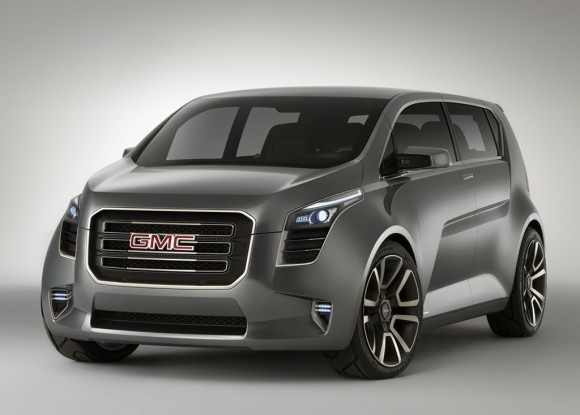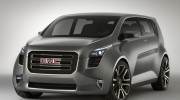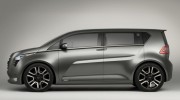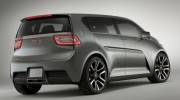
Combining a decidedly urban-industrial design aesthetic with functionality aimed at young professionals, the GMC Granite concept takes the brand’s trademark capability in a new, more progressive direction. It was introduced at the 2010 North American International Auto Show in Detroit.
If brought to market, the Granite would be the smallest GMC ever – but has been optimized to feel much larger. Its length is a full 2 feet shorter than the new Terrain compact crossover, but its open interior was designed to be spacious and flexible to fit the needs of active people. Generous cargo space and unique flipping/folding seats, for example, enable a mountain bike to be loaded completely inside with the tailgate closed.
Like GMC’s current lineup of trucks, SUVs and crossovers, the Granite delivers style and capability, with advanced features, high-quality materials and exceptional attention to detail. An industrial-influenced exterior is combined with a spacious interior that features precise instruments and leading-edge technology. The climate system, navigation and infotainment technologies, for example, are viewed via an extra-wide, next-generation organic light-emitting diode technology that is more dynamic than the conventional screens used in most production vehicles.
Power for the Granite concept comes from a 1.4L turbocharged engine that is part of GM’s new family of small-displacement, highly efficient four-cylinder engines. It is matched with a six-speed transmission that uses dual-clutch technology for performance and smoothness.
A cadre of young designers drew upon the preferences of young, urban professionals like themselves, who are very social and active. They are more likely to take friends to clubs and load outdoor gear on weekend excursions than to haul lumber or tow a boat. With those requirements in mind, they sketched out the dimensions of the Granite accordingly. Its 103.6-inch wheelbase is comparable to a Chevrolet Cobalt, but its 161.3-inch overall length is more than a foot shorter. Its size gives the Granite exceptional maneuverability, even within narrow urban streets.
The Granite’s comparatively short body length is complemented by a wide, 70.3-inch overall width and a tall, 60.5-inch height. Those dimensions create unique proportions that depart dramatically from conventional minivan, SUV or crossover designs.
Granite has four doors, hinged on each side to open like a set of French doors. There’s no pillar between the front and rear doors, making the Granite easier to enter, exit and load, even with bulky items.
In keeping with the vehicle’s urban theme, the exterior of the Granite has a series of complex, intersecting planes and angles, creating the impression of an industrial machine – an object created out of necessity, but admired for its precision and functional aesthetics.
A forward-angling motif that cuts through the door panels, starting high and behind the doors and cutting to the center of the front door, suggests motion, as does a high beltline and tapered side glass. A rear spoiler is integrated into the roof and extends slightly above the rear glass. Other angles and planes of the exterior appear carefully metal-crafted.
Up front, GMC’s signature grille design is flanked by headlamps that sweep back into the fenders, further suggesting motion. The headlamps and fog lamps are set at the far edges of the front-end bodywork, accentuating the Granite’s planted stance. At the rear, the vehicle’s planes and angles come together tightly, showing careful attention to detail. Other exterior elements include prominent taillamps with a multi-layer appearance and LED lighting technology; and a centered exhaust outlet with a brushed metal tip.
There is no chrome on the exterior of the Granite; all the trim has a satin or brushed metal finish, accenting the industrial look. Large, 20-inch wheels – wrapped in Bridgestone tires – were tailored within the fenders for a low, sporty stance. The exterior color of the Granite is metallic gray that evokes the look of the material for which this concept was named.
The interior was inspired by the design of aircraft-type mechanical instruments and precision tools. That is most apparent on the dashboard and instrument cluster, where gauges were modeled after finely crafted timepieces. A compass incorporated into the “barrel” surrounding the speedometer moves with every turn of the vehicle, providing an at-a-glance directional confirmation.
Red backlighting illuminates the gauges, while a panel of organic light-emitting diode screens is the foundation for the vehicle’s navigation, infotainment, phone and climate control readouts. The screens represent the next generation in vehicle information displays, with bright, multidimensional readouts and intuitive controls that give the Granite a modern feel.
Integrated within Granite are unmistakable GMC cues, including a center stack wing motif similar to that of the new GMC Terrain. A prominent center console runs between the front and rear seats, with ports to plug in popular portable electronic devices, as well as storage compartments large enough for a laptop computer.
The center console also houses a unique transmission shifter. Rather than a handle that actuates within a conventional gate, it is a simple, space-saving knob that rotates with the precise clicks of a torque wrench. The gear selections are confirmed via LED indicators.
Among the most functional elements of the Granite concept are reconfigurable seats. The front passenger and right rear seats flip up and fold in toward the center console, creating a long, unobstructed storage space. The Granite functionally addresses the needs of young professionals and their activities without compromises.
The cargo area includes a number of compartments to store items out of sight. Cargo hold-down provisions are built into the cargo area and the seatbacks have clasps that can be used when the seats are upright or folded to help secure cargo.
The Granite’s interior is finished with dark tones on the bottom and complementing, lighter colors on top, including suede-like Nubuck material on the seats and instrument panel. The interior is further accented by satin-finish and anodized trim. The instrument panel gives the impression of a command console, with driver-focused instruments and controls set in an anodized panel.

































